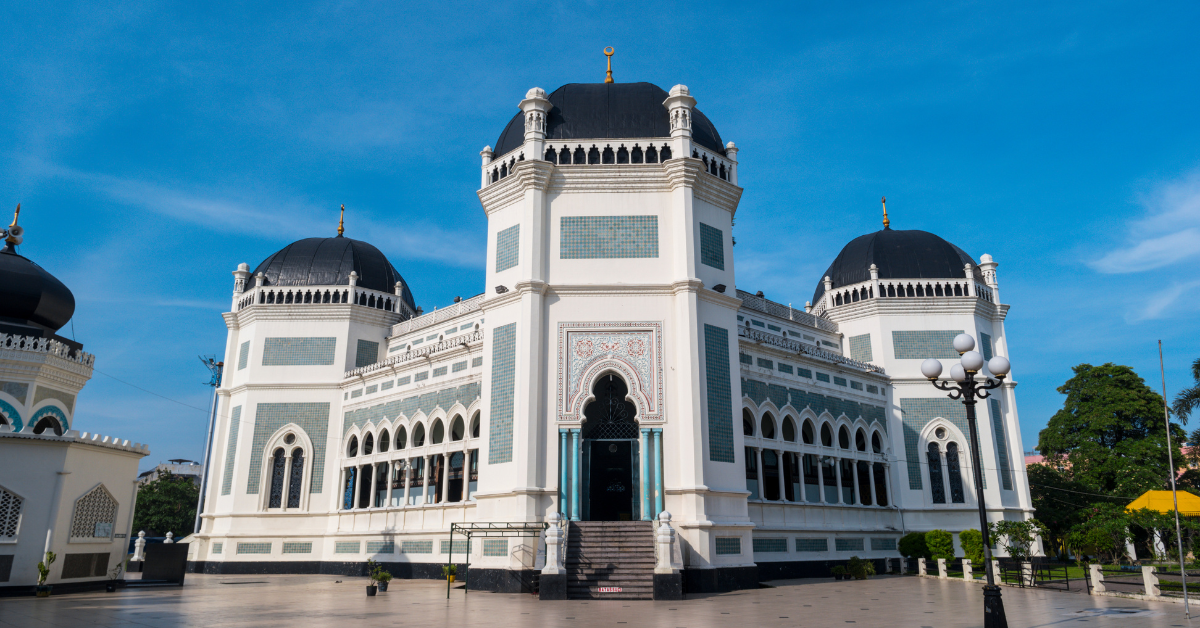Medan, the largest city in Sumatra, Indonesia, is known in Chinese as 棉兰 (Miěnlán), while in Japanese it is commonly written in katakana as メダン. This article explores the historical, economic, cultural, and sporting aspects of Medan, while analyzing the unique image Japanese people hold of this city.
The Chinese Character Notation “棉兰” and Its Japanese Form
In Chinese, there is a convention of transcribing foreign city names phonetically into characters. For Medan, the transcription 棉兰 (Miěnlán) is used. However, this is not a meaningful combination of characters; it was chosen purely for its phonetic resemblance.
In contrast, Japanese uses katakana and writes it as メダン, which is the standard in travel guides, diplomatic documents, and most contexts. Thus, “棉兰” is not common in Japanese, and “Medan” in katakana is the accepted form.
| Language | Notation | Pronunciation | Usage |
|---|---|---|---|
| Japanese | メダン | Medan | Used in tourism and official documents |
| Chinese | 棉兰 | Miěnlán | Common in Chinese-speaking regions |
| English | Medan | Medan | International standard form |
The Image of Medan Among Japanese People
Medan as an Economic City
Medan is the largest city on Sumatra and serves as its economic hub. It is particularly well known for palm oil and rubber industries, which are globally important, and Japanese companies have long been involved in trade and investment there.
Furthermore, the city has developed its port and airport, strengthening its role as a logistics hub connected to Singapore and Malaysia. For Japanese businesspeople, Medan is primarily associated with its role as a commercial city.
| Economic Sector | Key Features | Japanese Perception |
|---|---|---|
| Agriculture/Export | Palm oil, rubber | Trading partner for Japanese companies |
| Logistics | Port and airport development | International distribution hub |
| Urban Function | Largest city in Sumatra | Center of economy |
Historical Background and Japanese Impressions
During World War II, Indonesia was under Japanese occupation, and Medan was part of this regime. For the older generation, Medan is remembered as a city tied to historical memories of the war.
However, in the postwar era, Japan and Indonesia strengthened their ties through economic cooperation and technology transfer. Today, the city is viewed more as a partner in economic development, and the perception has shifted from conflict to cooperation.
| Period | Medan’s Position | Japanese Impression |
|---|---|---|
| Wartime | Under Japanese control | Heavy and complex memory |
| Postwar Early Period | Recovery and cooperation | Reconstruction of political and economic ties |
| Modern Times | Hub of economic exchange | Symbol of partnership |
Medan as a Tourism City
From a tourism perspective, Medan functions more as a gateway city rather than a destination itself. Many visitors use it as a base to explore Lake Toba and Bukit Lawang.
Lake Toba, one of the world’s largest caldera lakes, leaves a strong impression on Japanese travelers with its breathtaking scenery. Bukit Lawang, home to wild orangutans, is another highlight, especially for eco-tourism enthusiasts.
| Destination | Features | Japanese Tourist Interest |
|---|---|---|
| Lake Toba | One of the largest caldera lakes in the world | Sightseeing, photography |
| Bukit Lawang | Habitat of orangutans | Eco-tourism |
| Medan City | Colonial architecture, markets | Base for stay, cultural experience |
Sports and Medan
Sports play a vital role in the social life of Medan. Soccer is extremely popular, with local club matches drawing large crowds. The passionate cheering culture leaves a strong impression on visitors, including Japanese.
Additionally, badminton is a national sport, and the region has produced athletes who perform at international tournaments. For citizens, Medan-born athletes competing on the world stage are a source of local pride, reinforcing regional identity.
For Japanese tourists, attending sporting events offers a chance to experience the city’s energy firsthand.
| Sport | Popularity | Features |
|---|---|---|
| Soccer | Very high | Enthusiastic stadium atmosphere |
| Badminton | High | Produced world-class players |
| Other Sports | Moderate | Basketball and martial arts also present |
Comprehensive Evaluation of Medan by Japanese Tourists
Summarizing the above points, Japanese perceptions of Medan can be grouped as follows:
| Aspect | Features | Japanese Perception |
|---|---|---|
| Economy | Agriculture and logistics hub | Commercial city |
| History | Tied to wartime and postwar cooperation | Complex but positive |
| Tourism | Gateway to Lake Toba and Bukit Lawang | Entry point to nature |
| Sports | Soccer and badminton | Symbol of local culture |
Conclusion
The Chinese character notation for Medan, 棉兰, is a phonetic transcription used in Chinese, while katakana “メダン” is the standard form in Japanese.
For Japanese people, Medan represents multiple facets: an economic hub, a city with historical memory, a gateway to tourism, and a center of sports culture.
Far from being just another provincial city, Medan holds international value as a point of exchange and offers Japanese people a diverse set of impressions.






